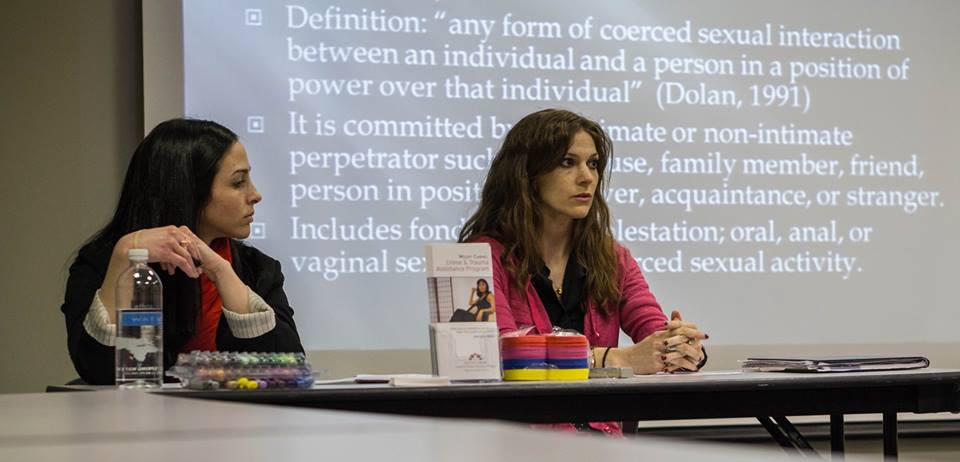With the growing popularity of media sensations such as “Fifty Shades of Grey” and Miley Cyrus now making bondage films, the more pressing issue of sexual violence is undeservedly buried deeper beneath the muck. Which is a problem.
The more sexual violence, and especially the victims of such trauma, are pushed below our radar, the more taboo the subject’s become. And the more taboo the subject, the less likely that any honest discussion can be had in the open, available not only to those already involved, but more importantly to those who are oblivious or ignorant to the facts.
However, the LOVE (Leave Out Violence Everywhere) series of lectures and workshops, put on by the Student Community and Engagement Office, plans to not only lift the veil but make Capital’s campus more open to handling these issues.
The most recent workshop, “Love After Crisis,” focused on how living day to day after going through trauma, such as being a victim of sexual violence.
It should be noted that trauma is when someone “experience[s] or witness[es] a life [being] threatened,” said Sari Winerman, one of the presenters of the workshop. “Sexual trauma is when the individual is not able to consent.”
If there was ever a doubt over consent before, Capital specifically details what it considers consent in its policy handbook. And it is important to remember:
“Alcohol can’t consent,” said Winerman.
“The most used drug,” added Suzi Rutti, the other presenter, “in drug-facilitated sexual assaults is alcohol.”
Dealing with traumatic situations alter the way survivors handle simple tasks, and the way they interact with other people, as well as their own cognitive abilities.
“Daily living gets harder when there’s trauma,” said Winerman. “There’s no right [or wrong way] to react.”
In most cases, the trauma will force the individual to either have hypo-arousal or hyper-arousal. Hypo-arousal appears as depression, with very little energy left in the victim, the unwillingness to speak or interact with other people, lack of motivation, and distance from the outside world. Hyper-arousal, on the other hand, is more akin to anxiety, with the victim unable to sit still. The victims also possess an exuberant amount of energy, experience loss of sleep, and have outbursts of anger. Once again, however, neither of these reactions are wrong. They are simply how the individual is dealing with the trauma.
Handling the trauma, though, should not be left solely to the victim.
In fact, the language popularly used for these situations is “survivors and co-survivors,” said Rutti.
While it cannot be stressed enough that the survivors of sexual violence deserve the upmost attention and care, in the past there has been a certain neglect toward friends and family who are also indirectly involved. They too experience a level of trauma, especially if they were in anyway a witness to the sexual violence.
“It’s more common than people know,” said Rachel Fountain. “The ramifications are intense.”
Capital is making steps in the right direction with dealing with survivors and co-survivors. The Health and Wellness Center is starting a peer advocacy group that will give people a safe place to share and deal with their traumatic experiences. Also, changes to the hearing process for sexual assault cases has changed in the past year, where a lot of pressure from process is alleviated from the victim, encouraging them to follow through.
Most importantly, both Winerman and Rutti stressed that when dealing with trauma, you have to focus on self-care, being able to take time out of your day to pay attention to your mind and your body, and being self-aware of how you are doing at that moment.
“This could involve relaxation, working out, doing yoga, or meditation,” said Winerman.
What matters most is being able to not only support yourself, but realizing when you need support from those closest around you.
“If more people were aware,” said Fountain. “It would do good for the population of those involved.”

